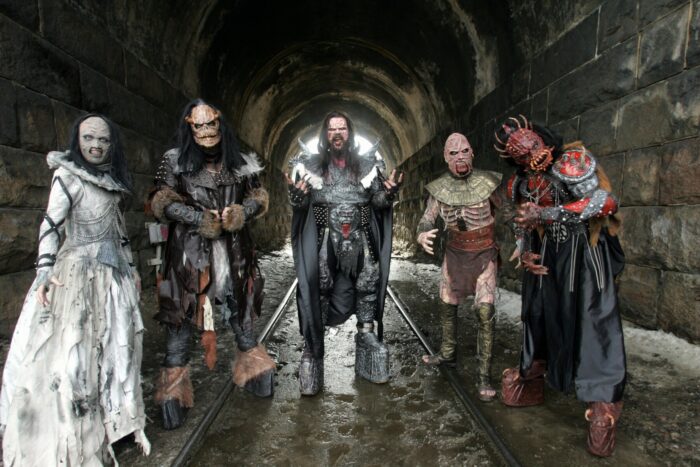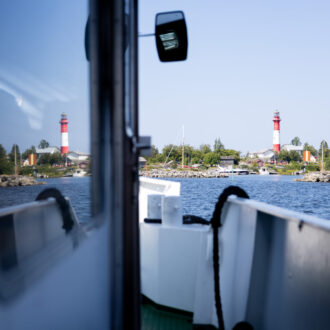The Eurovision Song Contest (ESC) is one of the world’s biggest, longest-running pop-culture events, bringing together fans of all ages in more than 50 countries since 1956. The europop championship has spawned megastars such as ABBA, Céline Dion and Julio Iglesias.
Finland first entered the competition in 1961, eventually earning the dubious distinction of submitting the most entries without ever winning. It placed last 11 times and was never better than sixth until 2006.
“We always had this image of being the country cousin who could never compete with the cool city kids,” recalls Hannah Norrena, a radio host at Yle, the Finnish national broadcasting company.
Then, the unthinkable happened: Lordi, a theatrical metal band in monster suits, won by the largest points margin ever, with “Hard Rock Hallelujah.” For Finland, this was a national triumph on par with winning its first world ice hockey championship in 1995.
Finnish talent wins in Sweden

Three guys from western Finland form KAJ, the Finnish band that Sweden picked as its Eurovision contestant in 2025. From left: Axel Åhman, Kevin Holmström and Jakob Norrgård.Photo: Erik Åhman
By 2025, Finland emerged as an exporter of ESC talent. Sweden chose KAJ, a comedic band from Finland, to represent it, with the tune “Bara bada bastu” (roughly “Let’s Just Sauna”). Meanwhile, a Finn cowrote the 2025 Estonian entry.
That followed Finland’s top-six ranking in 2021 with metal band Blind Channel, and a near-win two years later by Käärijä, a quirky Finnish-language rapper in a garish green bolero. He swept the largest number of popular votes, but lost out to Sweden in the professional jury vote.
The ESC is arranged by public broadcasters in nearly all European countries, with Yle formally selecting Finland’s entry each year.
Since 2012, Yle has hosted a series of public qualifiers called Uuden Musiikin Kilpailu (UMK, “New Music Competition”). In recent years, the UMK has attracted growing interest abroad, with thousands of ESC fans in other countries watching Finland’s national finals. That bodes well for Finland in Eurovision itself, when residents of the 56 European Broadcasting Union countries can vote for any country’s entry – except their own.
Lordi, hallelujah

Lordi, a Finnish metal band in monster costumes, won Eurovision 2006 by the largest points margin ever, with the tune “Hard Rock Hallelujah.”Photo: Markku Ulander/Lehtikuva
Lordi’s win was a game-changer, says Jouni Pihkakorpi, president of the Eurovision fan club OGAE Finland.
“We finally realised that we could send the kind of music that we’re good at – and that’s rock,” he says.
“The most important thing we learned is confidence,” says Norrena. “We had a tradition of being so mediocre at Eurovision and got used to losing. Then Lordi woke us up to the possibility of actually winning!”
Besides the monster rockers and Blind Channel, Finnish entries have included plenty of guitar rock, going back to Vicky Rosti in 1987. In 2015, that included an 86-second blast of raw punk by Pertti Kurikan Nimipäivät that startled the slick contest. It was the first punk band at Eurovision, and its members were the first Eurovision performers with disabilities.
Pops and flops

Fans from all over Europe fly their flags when the Eurovision Song Contest is broadcast.Photo: Vesa Moilanen/Lehtikuva
Other Finnish tunes have ranged from bluegrass, folk and reggae to Anneli Saaristo’s flamenco-tinged “La Dolce Vita,” which placed seventh in 1989. Before that, many entries were endearingly homespun. Some now sound unintentionally kitschy – even cringeworthy – despite the efforts of domestic megastars such as Vesa-Matti Loiri and Katri-Helena.
“Being too modest or uncertain was always Finland’s sin,” says Pihkakorpi. “As a result, the songs were often bland and unsurprising, with a few exceptions. Now I’m proud that Finland dares to send songs that are unconventional and different, but that people still love.”
Until the turn of the millennium, the entries were almost all in Finnish – but the success of Käärijä and Saaristo showed that’s not necessarily a problem. However, past international popularity is no guarantee of ESC success, as shown by recent flops by electronic producer Darude and pop-rockers The Rasmus.
The social network

Käärijä, a quirky Finnish-language rapper in a garish green bolero, swept the popular vote in 2023 but lost out to Sweden in the professional jury vote.Photo: Malin Lövkvist/Aftonbladet/Lehtikuva
Norrena points to the growing importance of social media, noting that “Blind Channel, Käärijä and The Rasmus all did fun social content that lured in international fans. And Käärijä’s charm is what got him to second place. The juxtaposition of that arrogant song with his humble personality was magic.”
Eurovision blogger and event host Tony Latva (a.k.a. DJ Werneri) agrees, pointing out that “Käärijä put in a tremendous amount of work behind the scenes, which contributed to his success. He’s a fantastic personality, a great live performer and has other really good songs as well. Eurovision gave him an amazing launchpad for his career.”
In 2025, the ESC asked Käärijä back – some former contestants are invited to perform as part of the festivities.
Latva says that networking is crucial these days. “A good, unique and catchy song isn’t enough,” he adds. “Käärijä showed that vocal ability also matters, as the juries clearly value that. And nowadays a certain level of shock value is almost a requirement.”
He sees the UMK system as crucial for developing new talent.
“Käärijä’s success changed artists’ attitudes at home,” he says. “The UMK now produces hits for the Finnish singles chart and raises many artists to popularity even if they aren’t chosen. For example, Erika Vikman got a big career boost back in 2020 [when she placed second in the UMK] before being chosen to represent Finland in 2025.”
By Wif Stenger, May 2025







